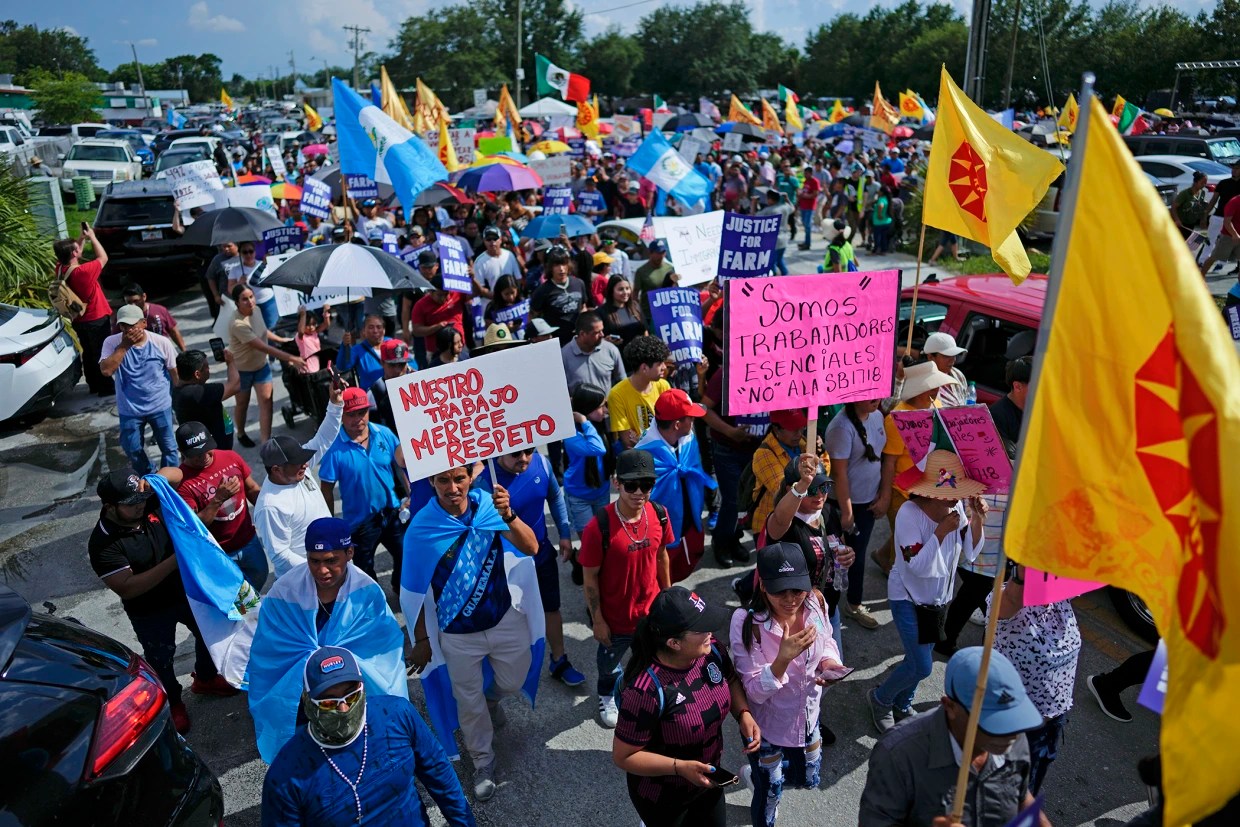President Joe Biden on Tuesday unveiled plans to enact immediate significant restrictions on migrants seeking asylum at the U.S.-Mexico border as the White House tries to neutralize immigration as a political liability ahead of the November elections.
“The border is not a political issue to be weaponized,” Biden said, while accusing former President Donald Trump and top Republicans of undermining bipartisan legislation that would have better addressed the issue.
He said that Republicans "have left me no choice” and he is seeking to “do what I can on my own to address the border.” He said he acted to restrict asylum to help “gain control” of the border.
The White House detailed the long-anticipated presidential proclamation signed by Biden, which would bar migrants from being granted asylum when U.S. officials deem that the southern border is overwhelmed. The Democratic president has contemplated unilateral action for months, especially after the collapse of a bipartisan border security deal in Congress that most Republican lawmakers rejected at the behest of Donald Trump, the presumptive GOP presidential nominee.
Get top local stories in San Diego delivered to you every morning. >Sign up for NBC San Diego's News Headlines newsletter.
The order will go into effect when the number of border encounters between ports of entry hits 2,500 per day, according to senior administration officials. That means Biden’s order should go into effect immediately, because that figure is higher than the daily averages now. The restrictions would be in effect until two weeks after the daily encounter numbers are at or below 1,500 per day between ports of entry, under a seven-day average. Those figures were first reported by The Associated Press on Monday.
Once this order is in effect, migrants who arrive at the border but do not express fear of returning to their home countries will be subject to immediate removal from the United States, within a matter of days or even hours. Those migrants would face punishments that could include a five-year bar from reentering the U.S., as well as potential criminal prosecution.
Meanwhile, anyone who expresses that fear or intention to seek asylum will be screened by a U.S. asylum officer but at a higher standard than what is currently used. If they pass the screening, they can pursue more limited forms of humanitarian protection, including the U.N. Convention Against Torture.
The directive is coming when the number of migrants encountered at the border have been on a consistent decline since December, but senior administration officials nonetheless justified the order by arguing that the numbers are still too high and that the figures could spike in better weather, when the encounter numbers traditionally increase.
Yet many questions and complications remain about how Biden's new directive would be implemented.
For instance, the Biden administration already has an agreement with Mexico in which Mexico agrees to accept up to 30,000 citizens a month from Cuba, Haiti, Nicaragua and Venezuela once they are denied entry from the U.S., and senior administration officials say that will continue under this order. But it is unclear what happens to nationals of other countries who are denied under Biden’s directive.
Senior officials also acknowledged that the administration’s goal of deporting migrants quickly is complicated by insufficient funding from Congress to do so. The administration also faces certain legal constraints when it comes to detaining migrant families, although the administration said it would continue to abide by those obligations.
The legal authority being invoked by Biden comes under Section 212(f) of the Immigration and Nationality Act, which allows a president to limit entries for certain migrants if it’s deemed “detrimental” to the national interest. Senior officials expressed confidence that they would be able to implement Biden’s order, despite threats from prominent legal groups to sue the administration over the directive.
“We intend to sue," said Lee Gelernt, an attorney for the American Civil Liberties Union who successfully argued similar legal challenges under Trump. "A ban on asylum is illegal just as it was when Trump unsuccessfully tried it.”
The senior administration officials insisted that Biden’s proposal differs dramatically from that of Trump, who leaned on the same provisions of the Immigration and Nationality Act that Biden is using, including his 2017 directive to bar citizens of Muslim-majority nations and his efforts in 2018 to clamp down on asylum.
For instance, Biden’s order outlines several groups of migrants who would be exempted due to humanitarian reasons, including victims of human trafficking, unaccompanied minors and those with severe medical emergencies.
Trump on Tuesday said on his social media account that Biden has “totally surrendered our Southern Border” and that the order was “all for show” ahead of their June 27 presidential debate.
The directive would also exempt migrants who arrive in what senior officials called an orderly fashion, which includes people who make appointments with border officials at ports of entry using the U.S. Customs and Border Protection’s CBP One app. About 1,450 appointments are made a day using the app, which launched last year.
Immigration advocates worried that Biden’s plan would only increase an already monthslong backlog of migrants waiting for an appointment through the app, especially when immigration authorities do not have an accompanying surge of funding.
It could also be difficult for border officials to implement the plan to quickly remove migrants when many agents are already tasked with helping in shelters and other humanitarian tasks, said Jennie Murray, the president of the National Immigration Forum.
“Customs and Border Protection cannot keep up with apprehensions as it is right now because they don’t have enough personnel so it would cause more disorder,” she said.
Average daily arrests for illegal crossings from Mexico were last below 2,500 in January 2021, the month that Biden took office. The last time the border encounters dipped to 1,500 a day was in July 2020, at the height of the COVID-19 pandemic.
Congressional Republicans dismissed Biden’s order as nothing more than a “political stunt” meant to show toughened immigration enforcement ahead of the election.
“He tried to convince us all for all this time that there was no way he could possibly fix the mess,” GOP House Speaker Mike Johnson said at a news conference. “Remember that he engineered it."
Biden said in January that he has “done all I can do” to control the border through his executive authority, but White House officials nonetheless telegraphed for months that the president would contemplate unilateral action. Democrats note that Biden waited for months in hopes of legislation rather than acting on his own, which can easily be reversed by his successor.
Democratic Senate Majority Leader Chuck Schumer said that legislation would have been more effective, but “Republican intransigence has forced the president’s hand.”
Associated Press writers Elliot Spagat in San Diego and Fatima Hussein on Air Force One contributed to this report.



